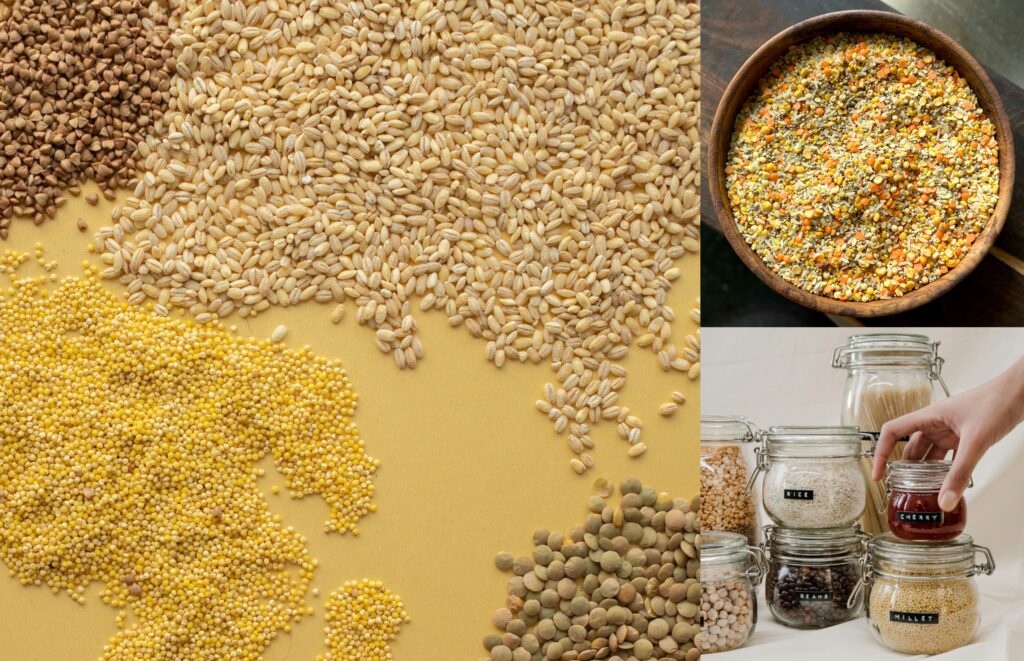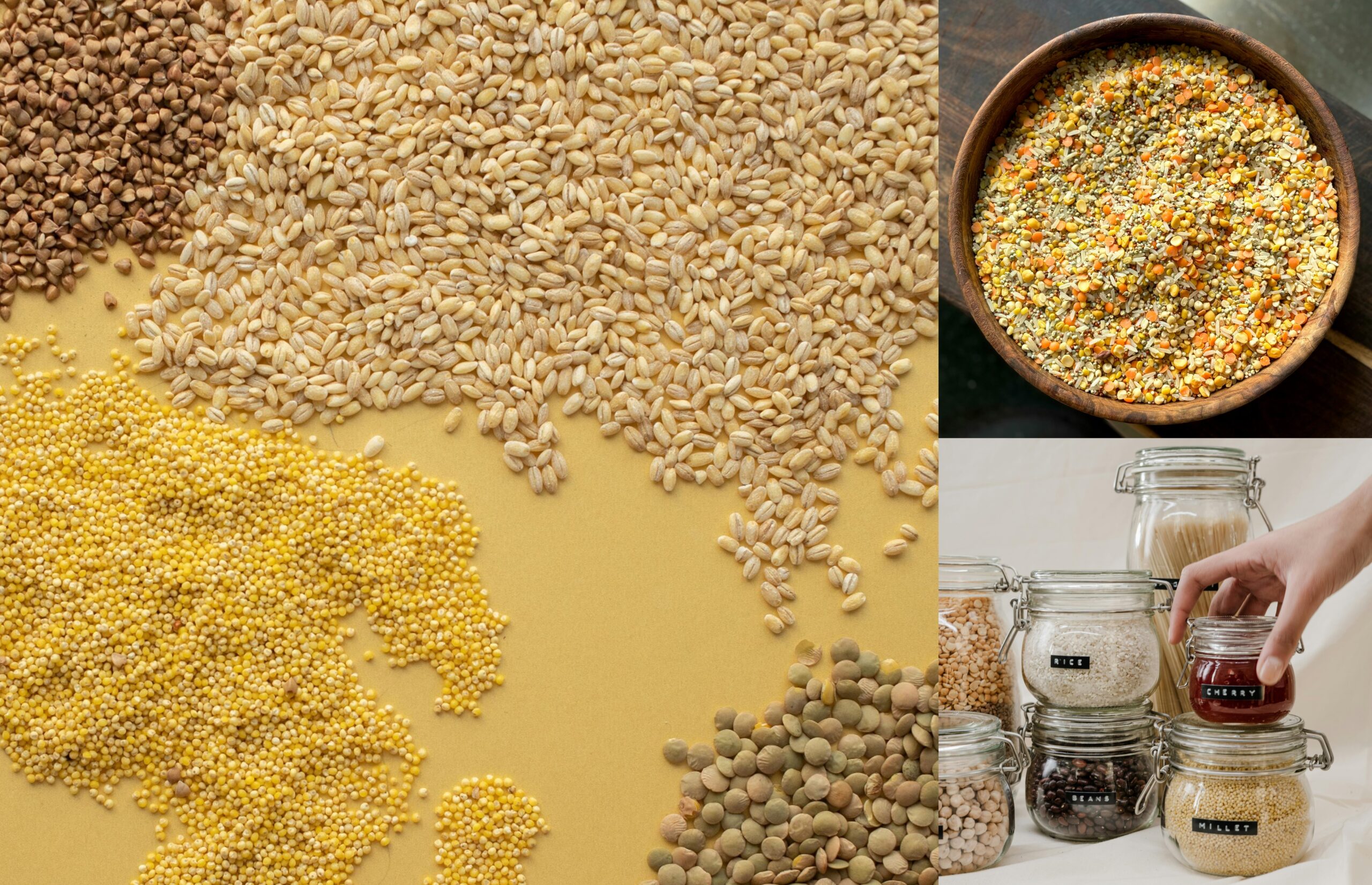Table of Contents

Introduction
Rediscovering Millets in the Modern Kitchen: Millets, often referred to as ancient grains, are making a grand comeback in modern kitchens worldwide. Once a staple in traditional diets, these small-seeded grasses have been largely overshadowed by the global dominance of wheat, rice, and corn. However, with a growing emphasis on nutrition and gut health, millets are regaining their rightful place on our plates. In this article, we will explore the nutritional benefits of millets, their positive impact on gut health, and how to seamlessly incorporate them into your daily diet.
Millets as a Nutritional Powerhouse
Millets are a group of highly variable small-seeded grasses, widely grown around the world as cereal crops or grains for fodder. They include sorghum, pearl millet, finger millet, foxtail millet, and others. What sets millets apart from other grains is their exceptional nutrient profile.
- Rich in Fiber: Millets are high in dietary fiber, which aids in digestion and promotes regular bowel movements. This fiber content makes them an excellent choice for maintaining gut health.
- Packed with Essential Nutrients: Millets are rich in vitamins and minerals such as magnesium, phosphorus, iron, and B-vitamins. They are also an excellent source of protein, particularly for those following vegetarian or vegan diets.
- Low Glycemic Index: Millets have a low glycemic index (GI), which means they cause a slower and lower rise in blood glucose levels. This makes them ideal for people managing diabetes or looking to maintain stable energy levels throughout the day.
- Gluten-Free: For those with gluten intolerance or celiac disease, millets offer a safe and nutritious alternative to wheat and other gluten-containing grains.
The Connection between Millets and Gut Health
Gut health has become a focal point of modern nutrition, with emerging research highlighting the importance of a healthy gut microbiome for overall well-being. Millets contribute to gut health in several ways:
- Prebiotic Properties: The dietary fiber in millets acts as a prebiotic, feeding beneficial bacteria in the gut. This helps to maintain a healthy balance of gut flora, which is crucial for digestion, immunity, and even mental health.
- Alleviation of Digestive Disorders: Due to their high fiber content, millets can help prevent and manage digestive disorders such as constipation, irritable bowel syndrome (IBS), and diverticulitis.
- Anti-Inflammatory Effects: Certain compounds in millets, such as phenolics and flavonoids, have been shown to have anti-inflammatory properties. This can be particularly beneficial in reducing gut inflammation, which is often linked to various chronic diseases.
Integrating Millets in the Modern Kitchen
Incorporating millets into your diet does not require a complete overhaul of your eating habits. Here are some practical ways to add these nutritious grains to your meals.
- Millet Porridge for Breakfast: Replace your usual oats or rice porridge with millet porridge. Add fruits, nuts, and seeds for a hearty, nutritious start to your day.
- Millet Salads: Cooked and cooled millets can be used as a base for salads. Mix them with fresh vegetables, herbs, and a light dressing for a refreshing and fiber-rich meal.
- Millet Flour: Use millet flour as a substitute for wheat flour in baking. It works well in pancakes, muffins, and flatbreads, providing a gluten-free option that is just as delicious.
- Millet as a Rice Alternative: Swap white rice with cooked millets in your main dishes. They pair well with curries, stir-fries, and even sushi.
- Millet Snacks: Millets can be puffed or popped, similar to popcorn, and seasoned to make a healthy and crunchy snack.
Scientific Backing: The Health Benefits of Millets
Numerous scientific studies support the health benefits of millets, particularly in the context of nutrition and gut health. A study published in the Journal of Food Science and Technology highlights that millets are rich in bioactive compounds, which can reduce the risk of chronic diseases such as diabetes, cardiovascular diseases, and certain types of cancer.
Another research article in the International Journal of Molecular Sciences discusses the role of millets in promoting gut health by acting as prebiotics. The study emphasizes that the dietary fiber in millets enhances the growth of beneficial gut bacteria, contributing to a balanced and healthy gut microbiome.
Millets for Specific Dietary Needs
- Millets for Weight Management: Due to their high fiber content and low GI, millets can help in weight management by promoting satiety and reducing hunger pangs. This can lead to a lower overall calorie intake, making them an ideal choice for those looking to lose or maintain weight.
- Millets for Diabetes Management: Millets’ low GI helps in controlling blood sugar levels, making them suitable for diabetics. A study published in Nutrition Research found that regular consumption of millets can significantly improve glycemic control in people with type 2 diabetes.
- Millets for Gluten Intolerance: Since millets are naturally gluten-free, they are a perfect grain alternative for those with celiac disease or non-celiac gluten sensitivity. They provide the necessary nutrients without causing the digestive distress associated with gluten.
Addressing Common Concerns about Millets in the Modern Kitchen
Despite their many benefits, some people may have concerns about adding millets to their diet. Let us address some of these common concerns:
- Are Millets Difficult to Digest? While millets are high in fiber, which can be difficult to digest for some people, proper cooking and soaking can make them easier to digest. Soaking millets overnight or for several hours before cooking can help reduce their phytic acid content, making them more digestible.
- Do Millets Have Antinutrients? Like many other grains and legumes, millets contain antinutrients such as phytic acid that can hinder the absorption of minerals. However, these can be minimized through soaking, fermentation, and proper cooking techniques.
- Is Millet Consumption Safe for Everyone? Generally, millets are safe for most people, including children and the elderly. However, those with specific health conditions, such as thyroid disorders, should consult a healthcare provider before making significant dietary changes, as millets can interfere with iodine absorption.
Conclusion: Embracing Millets for Better Health
Millets are a versatile and nutrient-dense addition to the modern diet, offering numerous health benefits, particularly for gut health. Their high fiber content, low glycemic index, and rich nutrient profile make them a valuable alternative to more common grains. As the scientific community continues to explore the benefits of millets, their role in promoting a healthy gut and overall well-being becomes increasingly clear.
Incorporating millets into your diet does not have to be complicated. Whether you are looking to improve your gut health, manage your weight, or simply diversify your meals, millets provide a delicious and nutritious option. With a little creativity for millets in the modern kitchen, can become a staple in your diet, contributing to long-term health and vitality.
Moreover, embracing millets in the modern kitchen is not just about personal health—it also aligns with broader goals of sustainability and environmental stewardship. Millets are resilient crops that require fewer resources, such as water and fertilizers, compared to more common grains like rice and wheat. Their ability to thrive in arid and semi-arid regions makes them a key player in sustainable agriculture, offering a way to support food security in areas affected by climate change.
Furthermore, the resurgence of millets in the modern kitchen reflects a broader movement towards reclaiming traditional and indigenous foods that have been marginalized by industrial agriculture. By reintroducing millets into our diets, we are not only nourishing our bodies but also preserving culinary heritage and supporting local farming communities that cultivate these ancient grains.
In the era of fast food and processed meals, millets offer a return to wholesome, natural eating. They remind us that food is not just fuel—it is medicine, culture, and a connection to the earth. As we continue to face health challenges such as obesity, diabetes, and digestive disorders, millets stand out as a powerful ally in the quest for better health. By making them a regular part of your diet, you are taking a proactive step towards a healthier, more balanced lifestyle.
As awareness of their benefits grows, millets are poised to become a global dietary staple once again. Whether you are an experienced cook or a kitchen novice, the simplicity and versatility of millets make them easy to incorporate into your daily meals. From breakfast porridge to dinner entrees, millets can be adapted to suit any cuisine, offering endless possibilities for delicious and nutritious dishes.
In conclusion, the return of millets in the modern kitchen diet represents a fusion of tradition and innovation, where ancient wisdom meets contemporary health science. By embracing millets, you are not only making a choice that benefits your health but also contributing to a more sustainable and equitable food system. So, as you explore the world of millets, you are not just enriching your palate—you are enhancing your life and the world around you.
Frequently Asked Questions (FAQs)
1. What are the health benefits of millets?
Millets are rich in fiber, vitamins, and minerals, supporting digestion, lowering blood sugar levels, and improving gut health.
2. Can millets help with weight loss?
Yes, the high fiber content in millets promotes satiety, helping to control appetite and manage weight.
3. Are millets suitable for people with gluten intolerance?
Millets are naturally gluten-free, making them a safe and nutritious option for those with celiac disease or gluten sensitivity.
4. How can I incorporate millets into my diet?
You can use millets in porridge, salads, as a rice substitute, in baking, or even as a healthy snack.
5. Do millets contain antinutrients?
Millets contain antinutrients like phytic acid, but their effects can be minimized through soaking, fermentation, and proper cooking.
References
https://www.mdpi.com/2076-3921/12/1/203
https://www.ncbi.nlm.nih.gov/pmc/articles/PMC4033754
https://www.mdpi.com/2304-8158/10/11/2523
https://www.mdpi.com/2297-8739/10/2/80
https://www.mdpi.com/2304-8158/10/11/2891
https://www.mdpi.com/2072-6643/14/13/2760
YouTube video linkhttps://youtube.com/shorts/p_7O90u8UpM?feature=share

